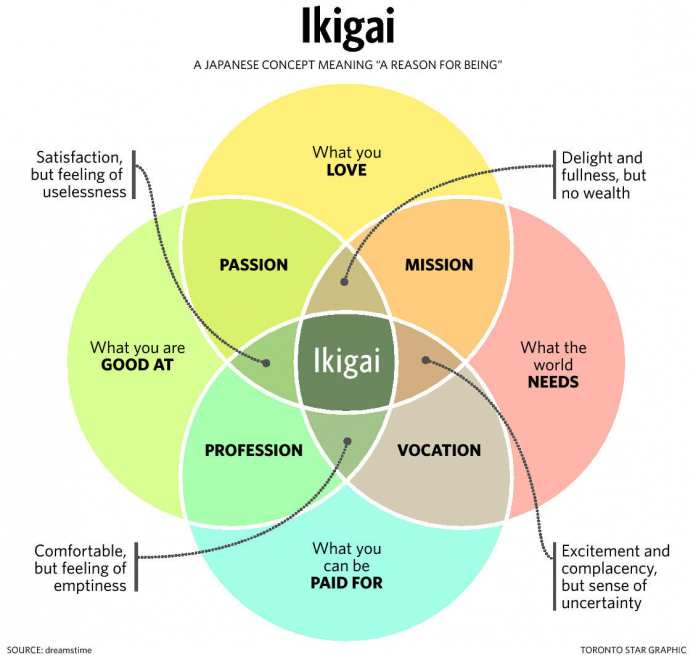The Japanese?s Secret to health, happiness and longevity.
 Photo by Content Pixie on Unsplash
Photo by Content Pixie on Unsplash
Have you ever thought:
If I earn this much money, I?ll be happier or if I owned that thing, I?ll be happier?
It?s refreshing to know that in recent years, as a society, we?ve started to move away from the idea that economic success, wealth and possessions are signs of achievement or the sole items responsible for our happiness.
Did you know?
- Japan is known for the life practices that lead to the longevity of its people, reaching an average life of 83.7 years.
- Previous studies have shown Japanese longevity to be closely related to dietary and health practices.
- New studies on Japanese philosophy have shown life fulfillment through ikigai as a key component to longevity.
What is Ikigai?
Philosophers have been deliberating over constructs that explain the pursuit of happiness and the meaning of life for centuries. Ikigai is one thought to combine the Japanese words ikiru, meaning ?to live?, and kai, meaning ?the sensation of what hopes for?. Together these definitions create ?a reason to live? or having a life purpose.
We all strive for satisfaction and purpose in our lives. Your ikigai is your reason for jumping out of bed in the morning, what motivates you to revel in and appreciate life every day.
Ikigai is a beneficial practice in career growth because like your own passions and needs, and what the world needs ? the meditation of ikigai grows and changes with you. There?s not necessarily an end to your ikigai practice, it?s an ongoing journey.
How to find your Ikigai?
According to Japanese culture, everyone has ikigai. Detecting our strengths is not always easy. There are four questions that can help us find our path. If you write them down somewhere where you come across them regularly, you can use them as a compass bringing you closer to your purpose.
To find your Ikigai, you must ask yourself:
1. What do I love? (passion)
2. What am I good at? (vocation)
3. What can I be paid for? (profession)
4. What does the world need? (mission)
Ikigai is the union point of four fundamental components of life: passion, vocation, profession and mission. In other words, where; what you love meets what you are good at, meets what you can be valued and paid for meets that which the world needs. Ikigai is only complete if the goal implies service to the community. We feel more satisfied giving gifts than receiving. The next step, once you?ve identified these components, would be to start following your compass. Start working on your questions, and see how your answers fit in the Ikigai fundamental components.

According to the diagram, the intersection of what you are good at and what you can be paid for is your profession. The intersection of what the world needs and what you love is your mission.
Sometimes three of the criteria overlap, like the case where your passion (what you are good and what you love) and your mission (what you love and what the world needs) overlap. In that case, you have ?delight and fullness, but no wealth.? Ikigai is when all four criteria are satisfied.
?Don?t ask what the world needs. Ask what makes you come alive and go do it. Because what the world needs is more people who have come alive.? ~Howard Thurman
What the world needs, and what people will pay for are the same.
An economist wouldn?t really see a difference between what the world needs and what you can be paid for. If somebody needs something, then they would be willing to pay for it. If somebody is willing to pay for something, then they necessarily want or need it.
Even if we consider social problems like poverty and homelessness, those with resources are willing to pay to help alleviate these problems. We economize on the use of resources to alleviate social problems through voluntary donations from others. Thus, somebody with a need who cannot pay for that need to be met is still covered by the blue-red total eclipse.
?People have the potential to create your environment. Your environment then determines your mindset, and your mindset determines your future?. ~Myles Munroe (The Principles and Power of Vision)
The law of association guarantees you a spot in the division of labour.
Furthermore, the law of association guarantees that everyone has a comparative advantage. Using the language of the Ikigai graphic above, everybody has a guaranteed spot in what you are good at and what you can be paid for overlap. And since the blue and the red circles are really the same, what this means is that everybody has the profession-vocation combination.
Everybody has a comparative advantage because even if somebody is really good at something, it means they incur a high cost by doing anything else. Said another way, if somebody is really good at something, then somebody else can produce something else at a relatively lower cost. The law of association is based on this logic. One man?s relative productivity in A is necessarily another man?s relative productivity in B.
Individuals find their comparative advantage by interacting with others in the market. It is only by surveying existing producers, goods, and the prices of those goods that one can make an informed decision on what to produce or where to apply for jobs.
 Photo by Rita Vicari on Unsplash
Photo by Rita Vicari on Unsplash
What you love and what you prefer.
The economic theory guarantees everyone a job that satisfies three out of four of the Ikigai criteria: what the world needs, what you can be paid for, and what you are good at.
Unfortunately, the economic theory cannot guarantee the fourth criterion: that you love what you do. That part is up to you and your values. Economics can guarantee, however, that you will do what you prefer, which might be considered a broader category that encompasses what you love to do.
 Photo by Jeff Nissen on Unsplash
Photo by Jeff Nissen on Unsplash
The 5 pillars that enhance your Ikigai.
In addition to answering those four questions about ourselves, there is another layer to the Ikigai concept: It is much easier to feel Ikigai when we create social connections. This explanation is perhaps due to the ingrained social connections that Japanese society promotes and is conditioned to seek.
Ken Mogi, a neuroscientist and author of Awakening Your Ikigai, advises us to focus on what he labels the five pillars, which are:
1. Starting small
2. Accepting yourself
3. Connecting with the world around you
4. Seeking out small joys
5. Being in the here and now
To make the most of the five pillar method, Mogi suggests incorporating this mindset in the first couple of hours after you wake up to start your day on the right foot and get your brain accustomed to this way of thinking.
 Photo by Priscilla Du Preez on Unsplash
Photo by Priscilla Du Preez on Unsplash
Time to find your Ikigai.
Keeping the five pillars in mind, take 10 minutes to ask yourself those four core questions. Be honest in your answers and see what you come up with.
Over the next several weeks, set aside time to ponder these questions. You might even consider journaling your answer and thinking about how your answers change over time. Revisit them a month from now. Six months. A year.
We cannot expect to find our Ikigai overnight. Ikigai is an understanding of our own unique life mission, and for most, that takes many years ? and it often changes. However, the more determined you are to find your Ikigai, the more quickly you will do so.
If you found value in this article, please ? below and share it with your friends so others can enjoy it!


